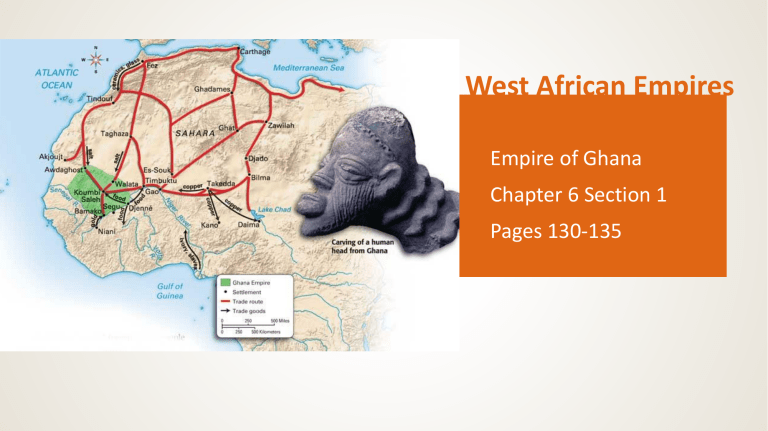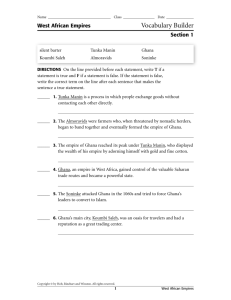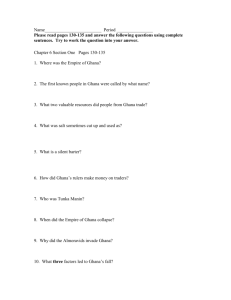ghana2015

Empire of Ghana
Chapter 6 Section 1
Pages 130-135
The first people in Ghana were farmers.
They were called the Soninke.
They banded together when threatened by nomadic herders.
• From 200-1000AD the Berbers controlled trans-Saharan trade and the West Africans did not profit.
• In 1050AD Ghana gained control of the trade routes and became a powerful empire.
The Soninke learned how to work iron.
They made farm tools and weapons causing their population to increase.
One of Ghana’s strengths was the use of iron weapons to defeat their neighbors.
Ghana was in a strategic trading location.
They traded very valuable GOLD and SALT using a process called
silent barter, in which they exchanged goods without any direct contact.
They also traded wheat from the north, sheep, cattle, and honey from the south, and leather, cloth and golden tassels from local areas.
Traders had to pay taxes on goods they brought and left with.
Neighboring tribes that were conquered had to pay tribute.
The Emperor of Ghana, allowed conquered kings to keep power as long as they paid taxes.
Local mines produced gold, but common people could only own gold dust, not gold nuggets.
The government used the gold and tax money to build their armies.
Koumbi Saleh was the largest and most important city in the empire of Ghana.
Koumbi Saleh was the center of trading in
Ghana. All trade items were found in its markets.
Tunka Manin was the king that led Ghana to its peak.
He had a splendid court that displayed they wealth of the empire for all to see.
Most people of Ghana followed the traditional
West African practice of Animism & Ancestor
Worship.
As trade with Muslims from North Africa increased, many people began to convert to
Islam.
There were 3 major factors that caused Ghana’s decline: invasion, overgrazing, and internal rebellion.
A Muslim group called the Almoravids attacked
Ghana to force its leaders to convert to Islam.
After 14 years, the Almoravids won.
They didn’t control Ghana for long, but they significantly weakened it.
The Almoravids let their animals eat all the grass in the pastures.
This exposed the soil to the hot desert winds, which blew it away and made it worthless for farming and herding.
In 1200, one of the countries that Ghana conquered rose up in rebellion.
However, they could not control it, so it was attacked by their neighbors. Ghana fell apart.
In 1300, Sundiata the King of Mali, defeated the last emperor of Ghana in battle.






